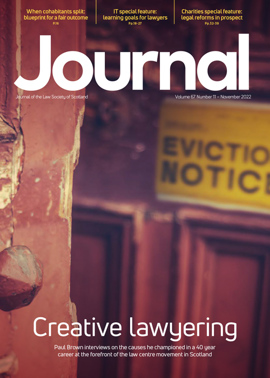Opinion: Robin Moira White
Sex. Such a simple word, but…
 In the September Journal, solicitor advocate Gordon Dangerfield defends, both in an article and a letter, the ruling by Lady Dorrian in For Women Scotland v Lord Advocate and Scottish Ministers [2021] CSIH 4 that “sex” within the meaning of the Equality Act 2010 means “biological” sex. This is a troubling ruling for a number of reasons, and one, in my opinion, unlikely to withstand further examination.
In the September Journal, solicitor advocate Gordon Dangerfield defends, both in an article and a letter, the ruling by Lady Dorrian in For Women Scotland v Lord Advocate and Scottish Ministers [2021] CSIH 4 that “sex” within the meaning of the Equality Act 2010 means “biological” sex. This is a troubling ruling for a number of reasons, and one, in my opinion, unlikely to withstand further examination.
One may see that Mr Dangerfield has a partisan interest in the field because he uses the phrase “trans-identified-males” in his article when referring to trans women, persons who have transitioned from male to female. In passing, it should be easy to see why such individuals, who have worked so hard to reject masculinity and assert their femininity, would find being referred to as such troubling and offensive. It is important, in such a contentious and personally felt area, to be more careful about language.
But “biological” sex is particularly difficult when dealing with an Act which looks at practical matters such as the workplace, education, provision of services and the like. There is no definition of “biological” sex in the Act. Does this mean chromosomal sex? Gonadal sex? Perceived sex? Birth certificate sex? And if the latter, then what is the effect of a gender recognition certificate on birth certificate sex? Chromosomal sex doesn’t help, as the naughty little “SR-Y” gene, responsible for masculinity, has a bit of a habit of appearing on X-chromosomes, and also relying on a suite of other genes performing correctly to produce effective masculinity.
How is any of the above to be tested? I would ask the reader to pause for a moment and consider. Have they ever had their chromosomes tested? How would that be practically performed? Would it be carried out at the door of every public toilet, changing room or gymnasium? Similarly, inspection of gonads?
Perceived sex is interesting. I am a trans woman who is open about her history. Undoubtedly at times I am perceived as female, male or somewhere in between. So that means I could be subject to sex discrimination (male or female), gender reassignment discrimination and sexual orientation discrimination from those who find it difficult to separate sex, gender reassignment and sexuality.
Answers to these questions are needed if “biological” sex is to be the test. And such answers are singularly lacking from Lady Dorrian or Mr Dangerfield.
I transitioned from male to female over a decade ago. Although I appear regularly in the Scottish and Northern Irish tribunals, I am a member of the England & Wales Bar and a resident of England. I would qualify for a gender recognition certificate under the Gender Recognition Act, but have not applied for one as I regard it as a demeaning process. Were I gay, for example, I would not have to so apply and be tested to see if I am “gay” enough to qualify. But the relevant authorities can tell. I have an “F”-marker passport and a driving licence with the driver number figures scrambled in the female way. My bank details, utility bills and professional registration reflect my identity.
“Sex” is not even regarded as purely “biological” by the Equality Act. Section 7, dealing with the protected characteristic of gender reassignment, refers to “physiological or other aspects of sex”. What are “physiological” aspects if not biological? – and so “other aspects”, such as clothing, hairstyle, name, honorifics or pronouns are, according to the Equality Act, just as much part of “sex”.
The Statutory Guidance to the Equality Act 2010 published in 2013, makes plain that those who have undergone gender reassignment should, without strong evidence supporting a justifiable reason not to, be accommodated in services which align with their affirmed gender. More recent pronouncements of the London Equality & Human Rights Commission to the contrary can (or should) be ignored, as the Scottish Human Rights Commission has said. I can’t imagine that reliance on Suella Braverman’s pronouncements (as Mr Dangerfield does) is the way to enlightenment. The old adage is that if you think the answer to a question is simple, you may well have misunderstood the question. Given that we don’t carry our birth certificates around with us, cannot routinely be tested for our chromosomes or our wider genome, and tend not to have our gonads on show, is all we are left with “perceived sex” in the view of an alleged discriminator, and is that, therefore, really different from gender?
Regulars
Perspectives
Features
Briefings
- Civil court: Broad sweep of the sheriff court
- Employment: Support through the cost of living crisis
- Family: Case management rules made for 2023
- Human rights: Protest as a defence to vandalism?
- Pensions: TPR issues auto-enrolment warning
- Property: New lease of life for commercial lets
- In-house: Advisers or leaders?






